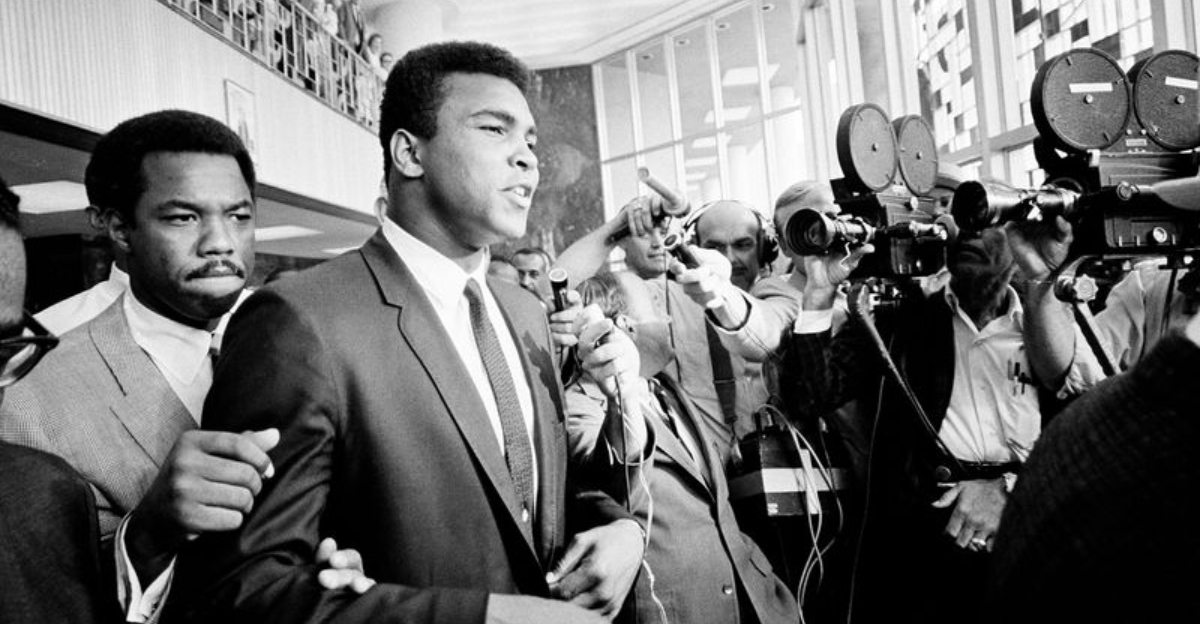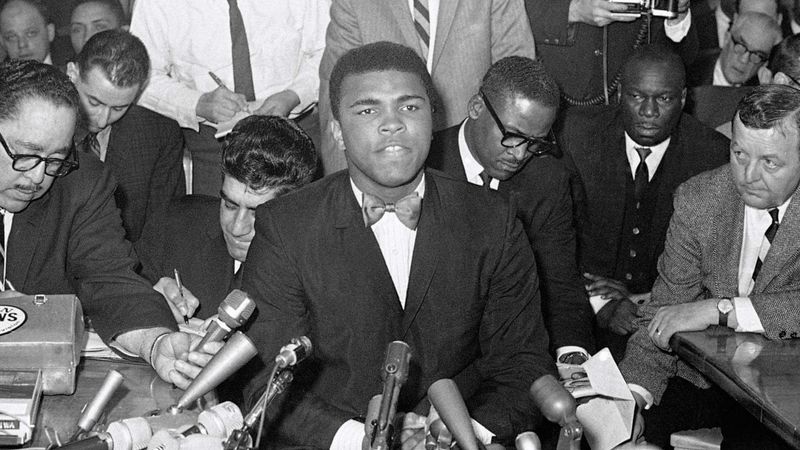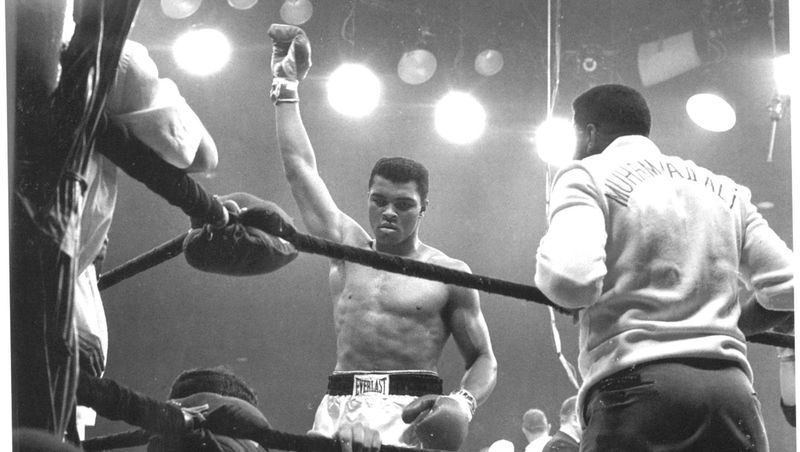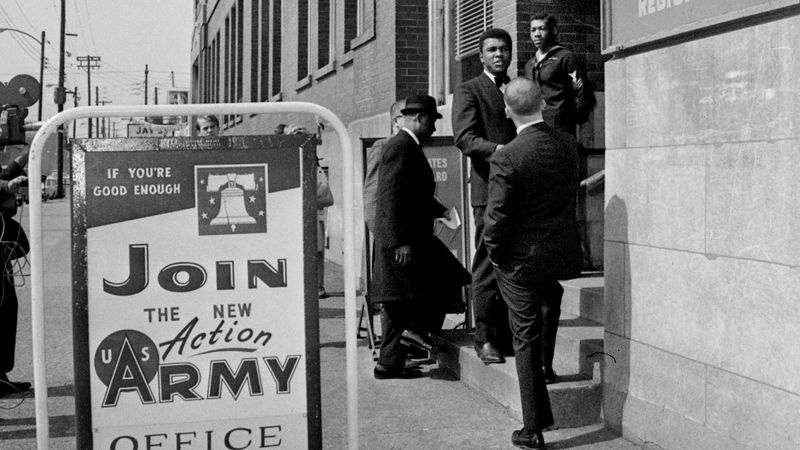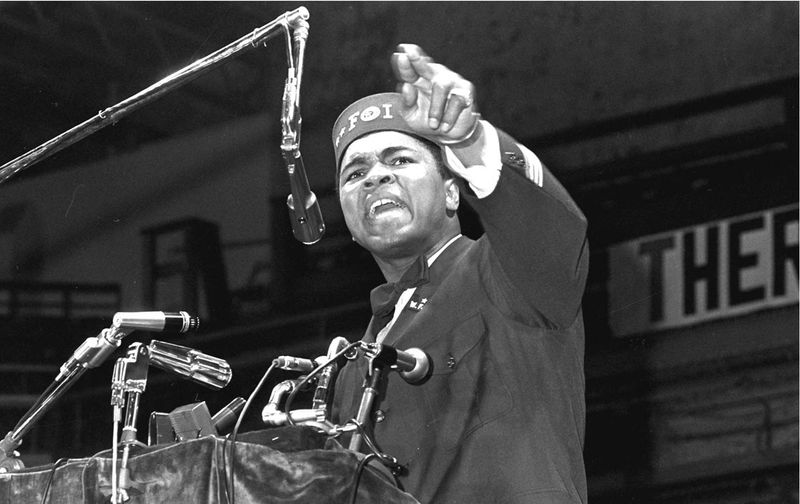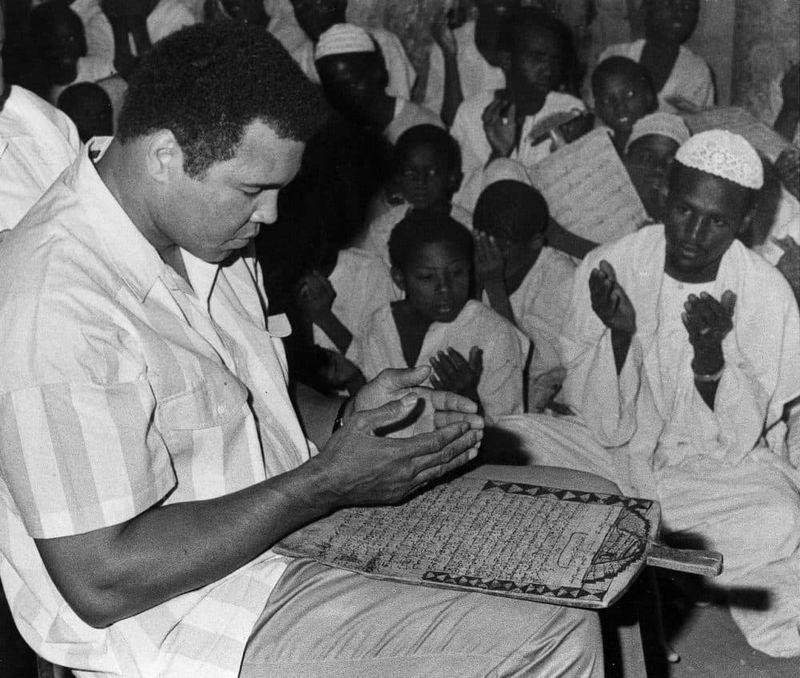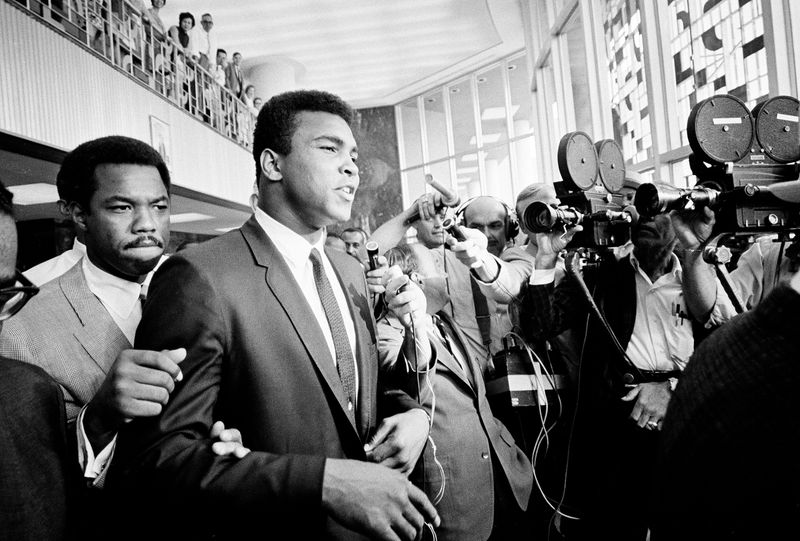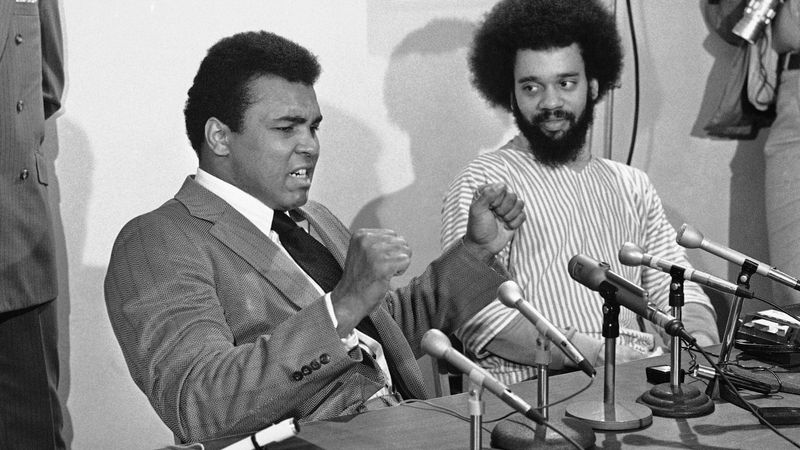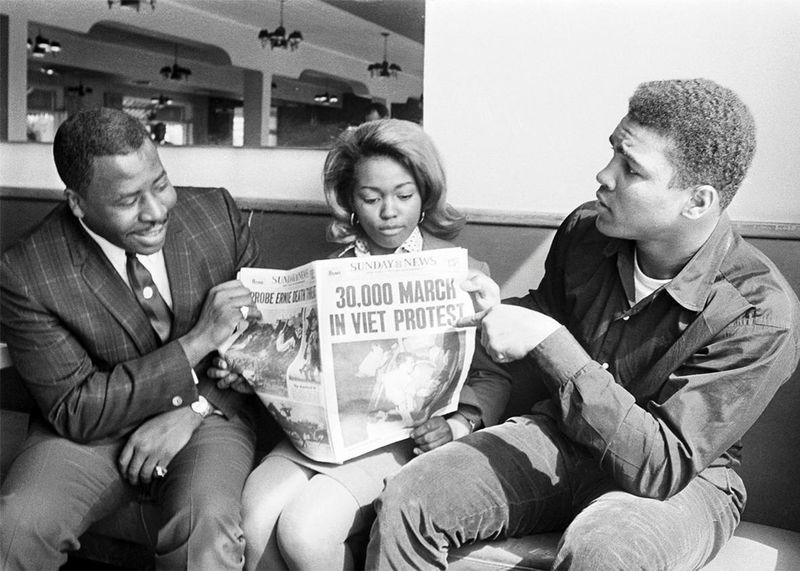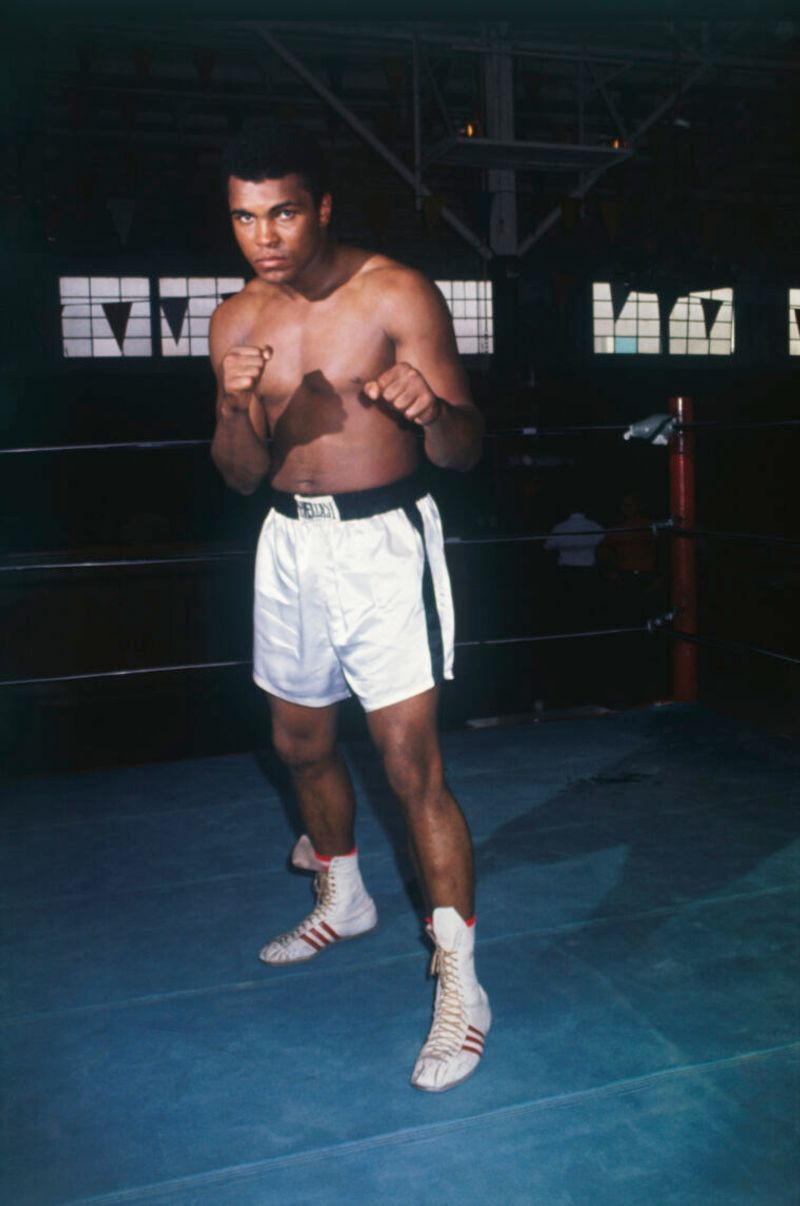Muhammad Ali is celebrated not just for his prowess in the ring, but for his unwavering commitment to his principles. Time and again, he made choices that prioritized his beliefs over his career, fame, and financial gain. Here are ten remarkable instances where Ali stood firm on his principles, despite the consequences.
1. Refusing Induction into the U.S. Army (1967)
In 1967, at the height of his boxing career, Muhammad Ali made a decision that echoed around the world. He refused induction into the U.S. Army, citing his religious beliefs and opposition to the Vietnam War. Ali’s defiance wasn’t without consequence; he knew this stand could lead him to prison and immense public outrage. Despite the looming threat, Ali stood unyielding, a beacon of courage. His stance sparked debates across America, challenging societal norms and highlighting the intersection of race, religion, and politics. This moment marked Ali as a symbol of resistance and integrity.
2. Accepting the Loss of His Heavyweight Title
When Muhammad Ali refused to be drafted, the repercussions were swift and severe. Stripped of his heavyweight title, banned from boxing for several years, Ali faced a future without the sport he loved. Yet, he remained steadfast, choosing to uphold his principles over reclaiming his championship status. This decision highlighted his deep commitment to his beliefs. The loss of his title, rather than diminishing his legacy, instead fortified it, showing the world that Ali was a man of integrity. His conviction in the face of such adversity became a defining chapter in his life.
3. Risking Prison Over Principles
Faced with a daunting five-year prison sentence and a $10,000 fine, Muhammad Ali stood his ground. He knew the legal battle ahead was fraught with risk, yet his principles guided him unwaveringly. The prospect of jail didn’t deter him; instead, it strengthened his resolve. Ali’s refusal to compromise, even under such pressure, showcased a fearless dedication to his beliefs. Living under the constant threat of incarceration, he remained an emblem of strength and moral courage. His fight against legal persecution inspired many, proving that true conviction is unyielding.
4. Speaking Out Against Racial Injustice
Muhammad Ali’s voice transcended the boxing ring, resonating in the fight against racial injustice. As one of the first major Black athletes to openly criticize systemic racism in America, he used his platform to advocate for change. Despite facing backlash from sponsors and mainstream media, Ali’s words ignited a movement. His speeches were laced with the fervor of a passionate advocate, determined to shine a light on inequality. Through his activism, Ali became a symbol of hope and resilience, inspiring generations to challenge oppression and strive for justice.
5. Aligning with the Nation of Islam
Converting to Islam and joining the Nation of Islam was a bold move for Muhammad Ali. This decision, rooted in personal faith, cost him fans and financial opportunities. Yet, Ali remained unwavering in his beliefs, embracing the teachings of the Nation of Islam with conviction. His alignment with this controversial movement during the 1960s was a testament to his courage and individuality. Ali’s spiritual journey was not without challenges, but his steadfastness in the face of adversity painted him as a man of principle. This alignment underscored his commitment to authenticity.
6. Changing His Name from Cassius Clay to Muhammad Ali
Rejecting his birth name, Cassius Clay, Muhammad Ali demanded to be recognized by his chosen identity. This decision was more than a name change; it was a declaration of independence from the legacy of slavery. Ali’s insistence on this new identity was radical at the time, yet he stood firm, embodying the spirit of self-definition. His unwavering stance, despite public and media resistance, highlighted his dedication to authenticity. For Ali, the name Muhammad signified freedom and empowerment, marking a pivotal moment in his journey toward self-realization and cultural pride.
7. Fighting in Court for His Beliefs
Muhammad Ali’s legal battle was a testament to his unyielding resolve. Challenging his draft evasion conviction all the way to the Supreme Court, he risked everything for his beliefs. This fight wasn’t just about his right to refuse the draft; it was about affirming his identity and principles. After years of legal turmoil, his conviction was overturned in 1971, marking a significant victory for Ali and the broader civil rights movement. His courage in the courtroom became a beacon of hope, illustrating the power of resilience and justice when principled individuals stand firm.
8. Turning Down Lucrative Deals During His Ban
While banned from boxing, Muhammad Ali faced financial uncertainty. Lucrative commercial endorsements and movie deals were within reach, yet they came with strings attached. These offers required him to “tone down” his political views, a compromise Ali was unwilling to make. His decision to turn down these opportunities, despite financial pressures, highlighted his integrity and commitment to his principles. Ali’s choice reinforced his image as a man who valued truth over wealth, leaving a legacy of authenticity. This period of resistance further cemented his status as a cultural and political icon.
9. Returning to Boxing Without Apology
Muhammad Ali’s return to boxing was marked by defiance and pride. After years of being banned, he re-entered the ring without seeking to “rehabilitate” his image. Instead, he remained outspoken about civil rights and anti-war causes, refusing to apologize for his past actions. Ali’s triumphant return was not just a personal victory, but a statement that he would continue fighting for what he believed in. His unyielding spirit captivated fans worldwide, reaffirming his position as a champion both inside and outside the ring. This chapter of his life was a testament to resilience.
10. Publicly Battling Parkinson’s Disease with Dignity
Even after retiring from boxing, Muhammad Ali faced new challenges with grace. Diagnosed with Parkinson’s disease, he chose to battle it publicly, continuing his humanitarian efforts and inspiring millions. Ali’s decision to remain in the public eye, despite his declining health, showcased his unwavering spirit. He became a symbol of courage and dignity, showing the world that strength isn’t just physical. Through this struggle, Ali continued to advocate for causes close to his heart, proving that a true champion’s fight never ends. His battle with Parkinson’s became another chapter in his legacy of resilience.
